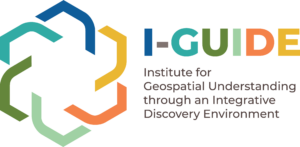The Institute for Geospatial Understanding through an Integrative Discovery Environment (I-GUIDE) is an interdisciplinary institute supported by the National Science Foundation that brings together people who are working on a wide variety of geospatial problems. I-GUIDE combines geospatial-related expertises and resources to achieve things that couldn’t be done individually.
There are many challenges to working with geospatial data. These challenges involve handling data, computing, finding people with the know-how to work with the data, getting ideas together, and figuring out what insights and solutions can be pursued. Geospatial problem solving is inherently interdisciplinary — it’s basically anything that’s got a geographic or spatial component. That’s the cool thing about this area: We are all doing geospatial work but using very different methods and data sources. This allows us to tackle these challenging problems because we have people looking at them with different perspectives.
To learn more about I-GUIDE visit our website.
Apply to I-GUIDE Undergraduate student research Opportunity.
What is this undergraduate student research opportunity?
In simple terms, this is an opportunity for students to develop geospatial data science skills by collaborating on collaborative projects with postdoc and faculty mentors. We expect the students to work closely in a team of 4-5 students and their faculty and postdoc mentors. This semester we have identified two projects human-environment relationship of aging dam infrastructure and the geospatial knowledge hypercube for geoAI. Here is some information about each of the projects.
Human-environment relationship of aging dam infrastructure
Most of the dams in the US are aged more than 50 years old and increasing vulnerability to failure. This project aims to identify the characteristics of the population who are vulnerable to disasters caused by their potential failures. Through the quantitative approach, we understand the relationship between human-environmental interaction in addressing the potential risks.
Keywords: Aging infrastructure, Social Science, Quantitative approach, Python, Geospatial Data Science
Tools/Skills: Python, Geospatial Data
Preference for student profile: Social science students experienced with Python programming
Geospatial Knowledge Hypercube for GeoAI
Today there are massive volumes of text data, including news, papers, social media etc. Many of them come with geospatial information. This project aims to discover structured knowledge representations from such unstructured data. This extracted structured knowledge i.e., hypercube is the foundation for many downstream geo-intelligence applications.
Keywords: Text Mining, Spatial Data Mining, Representation Learning, Multimodal Learning, GeoAI
Tools/Skills: Python, Text data, Geospatial data
Preference for student profile: Computer science students experienced with deep learning
We expect every student to work around 10 Hrs a week on their project and have a weekly team meeting with their mentors and teammates. This meeting could be scheduled at a mutually convenient time. At the end of the project expect each team to develop a project report and make a presentation on the topic to a broad audience from the I-GUIDE community.
Any undergraduate student in Illinois may apply. Students who have experiences in the tools or methods identified by the projects will be given preference.
We anticipate enrolling around 10 students. We estimate the projects will start by mid February and wrap up by the end of the semester.
At this point we are not planning to offer any academic credit for participating in the program.
If you have questions on this opportunity please contact Dr. Anand Padmanabhan at apadmana@illinois.edu.
Please fill out the application form at: https://forms.illinois.edu/sec/337814155. The deadline for application is February 21, 2023.
Students will be provided a modest stipend that is intended to compensate the number of hours they put into the project.
This is expected to be a 10 week program starting around the beginning of March and going through the end of semester.
